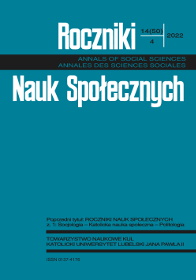Examining the Public Acceptability of Transportation Policy Through the Lens of Positioning Theory. A Case of the City Council Debate in Kraków, Poland
Abstract
This paper applies positioning analysis to the case study of the extraordinary city council meeting in Kraków devoted to assessing controversial transport policy instruments. Positions are entitlements to perform actions in an episode. The paper explores how actual positioning patterns of pro-policy and anti-policy camps calmed the conflict between them. It is claimed that conflicted parties shared three narratives (storylines) that secured political and public acceptance of the policy, albeit in a non-obvious way.
References
Aronson O. (2021), Victimhood in Swedish political discourse, Discourse & Society, 32(3), pp. 292-306.
Badarneh M.A. (2020), Discourses of defense: Self and other positioning in public responses to accusations of corruption in Jordan, Discourse Studies, 22(4), pp. 399-417.
Christiansen P. (2018), Public support of transport policy instruments, perceived transport quality and satisfaction with democracy. What is the relationship?, Transportation Research Part A: Policy and Practice, 118, pp. 305-318.
Christiansen P. (2020), The effects of transportation priority congruence for political legitimacy, Transportation Research Part A: Policy and Practice, 132, pp. 61-76.
Davies B. & Harré R. (1990), Positioning: The Discursive Production of Selves, Journal for the Theory of Social Behaviour, 20(1), pp. 43-63.
Eliasson J. (2014), The role of attitude structures, direct experience and reframing for the success of congestion pricing, Transportation Research Part A: Policy and Practice, 67, pp. 81-95.
Farrington J.H. (2007), The new narrative of accessibility: its potential contribution to discourses in (transport) geography, Journal of Transport Geography, 15(5), pp. 319-330.
Gałka P., Grzelec K., Hebel K., Judge E. & Wyszomirski O. (2020), Urban public transport as a tool of sustainable mobility policy – the example of Poland, Ekonomia Międzynarodowa, 31, pp. 154-184.
Gärling T. & Loukopoulos P. (2007), Effectiveness, Public Acceptance, and Political Feasibility of Coercive Measures for Reducing Car Traffic, [in:] T. Gärling & L. Steg (eds.), Threats from Car Traffic to the Quality of Urban Life, Oxford/Amsterdam: Elsevier, pp. 313-324.
Harré R. (2009), The Siren Song of Substantivalism, Journal for the Theory of Social Behaviour, 39(4), pp. 466-473.
Harré R., Moghaddam F.M., Cairnie T.P., Rothbart D. & Sabat S.R. (2009), Recent Advances in Positioning Theory, Theory & Psychology, 19(1), pp. 5-31.
Harré R. & Slocum N. (2003), Disputes as Complex Social Events: On the Uses of Positioning Theory, Common Knowledge, 9(1), pp. 100-118.
Henriksson M., Witzell J. & Isaksson K. (2019), All Change or Business as Usual? The Discursive Framing of Digitalized Smart Accessibility in Sweden, Transportation Research Procedia, 41, pp. 625-636.
Herbel-Eisenmann B., Sinclair N., Chval K.B., Clements D.H., Civil M., Pape S.J., Stephan M., Wanko J.J. & Wilkerson T.L. (2016), Research Committee: Positioning Mathematics Education Researchers to Influence Storylines, Journal for Research in Mathematics Education, 47(2), pp. 102-117.
Holden E., Banister D., Gössling S., Gilpin G. & Linnerud K. (2020), Grand Narratives for sustainable mobility: A conceptual review, Energy Research & Social Science, 65, pp. 1-10.
Holguín-Veras J., Encarnación T. & González-Calderón C.A. (2020), User perception of fairness of time-of-day pricing and other typical toll discounts, Transportation Research Part A: Policy and Practice, 137, pp. 560-581.
Kallenbach T. (2020), Narratives of urban mobility in Germany: on the threshold of a departure from the car-centered city?, Sustainability: Science, Practice, and Policy, 16(1), pp. 197-207.
Kayi-Aydar H. (2019), Positioning Theory in Applied Linguistics, [b.m.w.]: Palgrave Macmillan.
Liu Q., Lucas K. & Marsden G. (2021), Public acceptability of congestion charging in Beijing, China: How transferrable are Western ideas of public acceptability?, International Journal of Sustainable Transportation, 15(2), pp. 97-110.
Martens K. (2016), Transport Justice, New York: Routledge.
Martens K. (2020), How just is transportation justice theory? The issues of paternalism and production: A comment, Transportation Research Part A: Policy and Practice, 133, pp. 383-386.
Morton C., Mattioli G. & Anable J. (2021), Public acceptability towards Low Emission Zones: The role of attitudes, norms, emotions, and trust, Transportation Research Part A: Policy and Practice, 150, pp. 256-270.
Okraszewska R., Romanowska A., Wołek M., Oskarbski J., Birr K. & Jamroz K. (2018), Integration of a multilevel transport system model into sustainable Urban mobility planning, Sustainability, 10(2), pp. 1-20.
Pridmore A. & Miola A. (2011), Public acceptability of sustainable transport measures: A review of the literature (International Transport Forum Discussion Paper, No. 2011-20), https://doi.org/10.1787/2223439X.
Rinkinen J., Shove E. & Marsden G. (2021), Conceptualising Demand A Distinctive Approach to Consumption and Practice. New York: Routledge.
Roth P.A. (2017), Essentially narrative explanations, Studies in History and Philosophy of Science Part A, 62, pp. 42-50.
Selmoune A., Cheng Q., Wang L. & Liu Z. (2020), Influencing Factors in Congestion Pricing Acceptability: A Literature Review, Journal of Advanced Transportation, pp. 1-11.
Sosa López O. & Montero S. (2018), Expert-citizens: Producing and contesting sustainable mobility policy in Mexican cities, Journal of Transport Geography, 67, pp. 137-144.
Van Der Meulen J. & Mukhtar-Landgren D. (2021), Deconstructing accessibility–discursive barriers for increased cycling in Sweden, Mobilities, 16(4), pp. 493-508.
Vanoutrive T. & Cooper E. (2019), How just is transportation justice theory? The issues of paternalism and production, Transportation Research Part A: Policy and Practice, 122, pp. 112-119.
Vanoutrive T. & Zijlstra T. (2018), Who has the right to travel during peak hours? On congestion pricing and 'desirable' travellers, Transport Policy, 63, pp. 98-107.
Wagner D. & Herbel-Eisenmann B. (2009), Re-mythologizing mathematics through attention to classroom positioning, Educational Studies in Mathematics, 72(1), pp.1-15.
Wallsten A., Henriksson M. & Isaksson K. (2021), The Role of Local Public Authorities in Steering toward Smart and Sustainable Mobility: Findings from the Stockholm Metropolitan Area, Planning Practice & Research, 37(5), pp. 532-546.
Zanin A.C. & Bisel R.S. (2018), Discursive Positioning and Collective Resistance: How Managers Can Unwittingly Co-Create Team Resistance, Management Communication Quarterly, 32(1), pp. 31-59.
Copyright (c) 2022 Roczniki Nauk Społecznych

This work is licensed under a Creative Commons Attribution-NonCommercial-NoDerivatives 4.0 International License.


